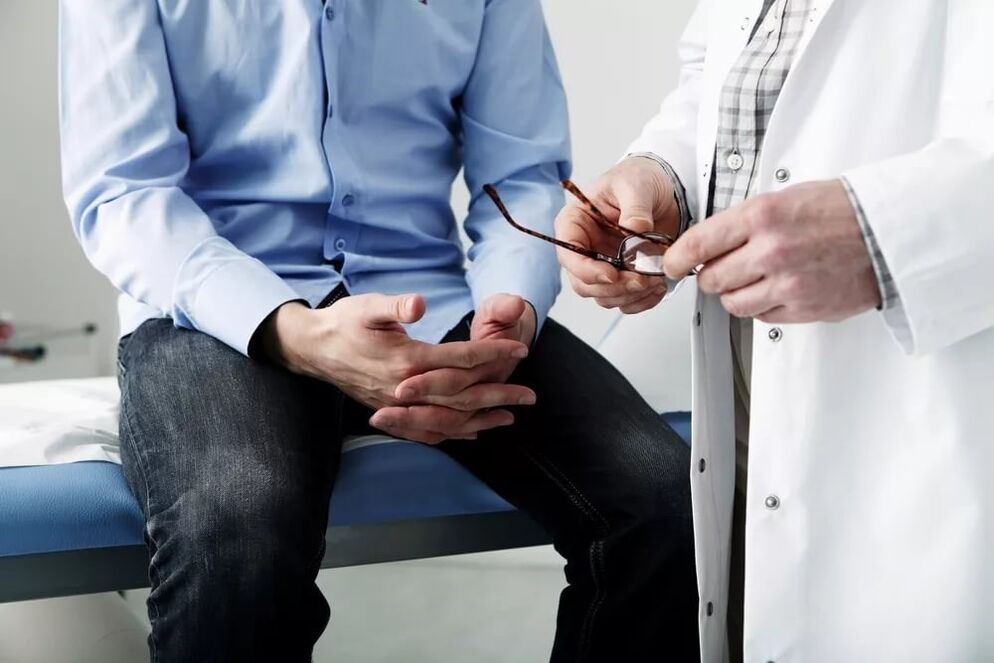
Prostatitis is an inflammatory lesion of the male prostate, which seriously affects the quality of life.
Causes of the development of prostatitis
There are the following risk factors:
- Reproductive tract infections;
- Weakened immunity;
- bad habits;
- Irregular sex life;
- Hypothermia;
- Sedentary lifestyle.
These factors help aggravate the slow inflammatory process (prostatitis) in the prostate. It is easier to help patients in the early stages of the inflammatory process than to wait for the clinical manifestations of the disease in the form of various urinary disorders, decreased quality of sexual life, or fertility difficulties.
Symptoms of prostatitis
Most patients do not complain in the early stages of the inflammatory process of the prostate (prostate), which is due to the small number of pain receptors in the organ itself.
Of course, when you are worried about the following situations, you need to consult a urologist:
- Perineum, pain in the lower abdomen;
- Urethral itching;
- Decline in the quality of sexual life;
- Frequent urination (not always painful);
- Must go to the toilet at night;
- Sex partners cannot become pregnant.
In addition, fever, weakness, and tension (including tension caused by fear) may also occur.
When symptoms (main complaint) appear, you should not delay starting treatment. The symptoms may be temporarily relieved, but they will progress without medical help.
Comprehensive treatment of prostatitis
In order to get effective treatment, you need to consult your doctor. The diagnosis is based on complaints, inspection data and test results. High-quality examinations ensure the diagnosis (to determine the cause) and the success of further treatment. Necessary examinations can be carried out in specialized clinics. If you already have laboratory test results and ultrasound results in your hands, the doctor at the clinic recommends that you bring them with you to your appointment. This will help you save your family budget and shorten exam time.
In the comprehensive treatment of prostatitis, doctors in the clinic use modern high-efficiency drugs, treatment procedures, exercise therapy, and nutritional advice. All of these allow you to eliminate the causes and consequences of the disease. This results in the patient's health being restored as quickly as possible.
Treatment of acute prostatitis
The basis of treatment is antibiotic therapy, which is tailored to specific patients under specific circumstances. As auxiliary drugs, anti-inflammatory and antipyretic drugs are used. It is recommended to drink plenty of water and rest in bed. If you cannot urinate, place a urinary catheter to expel urine. If an abscess occurs, the patient will experience opening of the suppurative foci through the urethra or through the abdomen.
With the severe stage of prostatitis, emergency treatment is needed in the hospital.
Effective treatment of chronic prostatitis
The compound effect on the prostate brings good results:
- Antibacterial, antiviral, and antifungal treatments are individually selected based on laboratory test results and the stage of the disease.
- Anti-inflammatory treatment.
- A preparation that restores weakened immunity.
- Massage the prostate can restore the structure and function of the organs and improve the supply of medicines.
- Exercise therapy increases the effectiveness of the first three points.
- Nutritional recommendations.
Prevent prostatitis
Primary prevention means preventing the disease itself in healthy people.
- Fight against a sedentary lifestyle. Including exercise therapy.
- For the most complete nutrition, a complex of vitamins and minerals (trace elements) must be used.
- If you do not have a permanent sexual partner, you must use a condom during sexual activity. And the refusal of oral sex (all the same microorganisms live in the oral cavity and genitourinary system).
- If you have a regular sexual partner, when urogenital infections (which may be complications after colds, food poisoning, and lack of hygiene) occur, you must use the same drugs for simultaneous treatment day after day.
- If you and your partner have anal sex, you must use a condom every time.
- Try not to get insufficient sleep. Counteract chronic stress (there are many books on this subject with results). Athletes should control overtraining as much as possible. And try to avoid frequent hypothermia (trying on clothes), which will destroy the body's overall resistance.
- If your libido declines, please see a urologist to maintain a regular sex life.
Secondary prevention means preventing the deterioration and recurrence of existing diseases.
In addition to the above suggestions, it is recommended to add the following:
- Check for hidden infections by a urologist.
- Use drugs that improve the structure and function of the prostate.
- Treat any infected lesions, including sinusitis and dental caries.
- If possible, limit alcohol intake.
- Food should contain adequate amounts of dietary fiber: vegetables, fruits, herbs, whole grains and bran.
- Treat concomitant diseases that reduce the effectiveness of the treatment. Among the most common and most important are diabetes, vascular disease, metabolic syndrome, and hormone deficiency (including the main male hormone-testosterone).

























